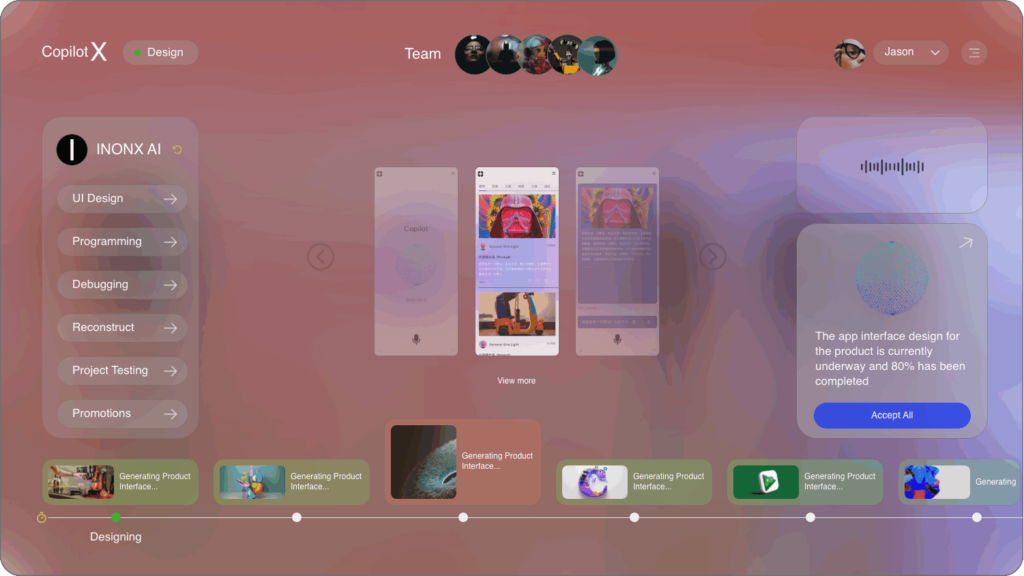In the rapidly evolving field of Artificial Intelligence (AI), recent breakthroughs are shaping the way we create content, facilitate teamwork among intelligent systems, and synthesize vast amounts of knowledge. This article explores three key developments: media generation, collaborative AI agents, and knowledge synthesis. As AI continues to embed itself in various sectors, the implications of these technologies are profound and vast.
**Media Generation and Its Implications for Content Creation**
AI’s capability to generate media content has reached new milestones. From automating the creation of written articles to generating realistic audio and video content, the potential applications are enormous. Recent advancements in generative models, such as OpenAI’s GPT-4 and Google’s Imagen, emphasize efficiency and creativity. These models can produce high-quality text, images, and even short videos with minimal human intervention, revolutionizing industries like journalism, entertainment, and marketing.
For instance, news organizations are increasingly using AI to draft articles, summarize information, and provide readers with personalized content. The Associated Press and Reuters have successfully implemented AI systems that create thousands of financial reports daily. The generated content is often indistinguishable from that produced by human reporters, showcasing the sophistication of AI in understanding context and writing style.
Furthermore, generative AI is taking strides in the arts, as illustrated by recent projects where AI collaborates with human artists to create unique pieces. Notable names in this domain, such as DALL-E and Midjourney, allow users to create original artwork simply by inputting descriptive text. This seamless synergy between human creativity and AI’s capabilities is opening new avenues for artistic expression and challenging traditional notions of authorship.
However, the rise of media generation also presents challenges, particularly concerning misinformation and copyright issues. As AI systems can create hyper-realistic fake content, the potential for manipulation and deception grows. Solutions are being explored, including AI algorithms designed to detect deepfakes and other misleading materials. Industry players are now focusing on developing ethical guidelines to ensure responsible use of generative AI in media creation.
**Collaborative AI Agents: A New Era in Teamwork**
Another fascinating area of AI development is the use of collaborative AI agents designed to work together or with humans. These agents are increasingly being embraced across various sectors, functioning as digital teammates that enhance productivity and decision-making processes. For example, in the field of software development, platforms like GitHub Copilot combine AI and human effort, providing suggestions and code help that streamline collaboration among software engineers.
Recent innovations have led to the creation of multi-agent systems where several AI agents can interact and collaborate to solve complex problems. Research conducted by institutions like Stanford and MIT has delved into these frameworks, showcasing how collaborative agents can optimize resource management, supply chain logistics, and even scientific research. These systems can collectively analyze vast datasets, coming up with solutions that might not have been apparent to individual agents.
A significant aspect of collaborative AI agents is their adaptability and learning mechanisms. As these agents engage in teamwork, they can learn from their interactions, effectively improving their performance over time. This creates a continuously evolving ecosystem of AI partners that are capable of tackling increasingly complex challenges.
On the human side, there is a growing interest in the implications of working alongside these intelligent systems. Businesses are rethinking workforce dynamics, with many investing in training programs to prepare employees for collaboration with AI. Ethical considerations also play a crucial role in these discussions, prompting debates on job displacement versus augmentation.
**Knowledge Synthesis: Transforming Data into Insights**
In our information-heavy age, vast amounts of data are generated daily, necessitating effective knowledge synthesis to extract valuable insights. AI systems are now increasingly employed to sift through this information and provide meaningful connections between disparate data points. Recent innovations have led to the development of sophisticated natural language processing (NLP) algorithms that facilitate the understanding and synthesis of complex knowledge.
For example, systems like OpenAI’s ChatGPT and Google’s BERT have shown remarkable capabilities in grasping and generating human language. Breaking down silos of knowledge, these models can pull information from diverse sources and generate comprehensive reports that summarize trends, insights, and relevant findings.
An application of this technology can be seen in healthcare, where AI can analyze patient data, treatment history, and research papers to suggest personalized treatment options. This synthesis of knowledge significantly enhances decision-making for healthcare professionals, adding layers of precision to patient care.
Additionally, knowledge synthesis is playing a pivotal role in academic research. Researchers are leveraging AI tools to aggregate and analyze literature in specific fields, aiding the identification of gaps in research and driving innovation. A recent collaboration between various universities has led to projects that utilize AI for systematic reviews and meta-analyses, streamlining the traditionally labor-intensive process of compiling scientific literature.
However, the challenge remains regarding the quality and accuracy of synthesized knowledge. Concerns over bias in data sources and algorithmic interpretations prompt ongoing research to improve AI systems’ adherence to ethical standards and accuracy.
**Conclusion: The Future of AI and Its Societal Impact**
As we witness the convergence of media generation, collaborative AI agents, and knowledge synthesis, the potential of AI to transform society is both exciting and daunting. Industries can benefit immensely from these advancements, enhancing productivity, creativity, and decision-making processes. However, the implications for ethics, job displacement, and the verification of information necessitate thoughtful consideration.
AI’s rapid evolution shows no signs of slowing down, and its integration into various aspects of our lives continues to increase. Stakeholders in the technology sector, from researchers to policymakers, must work collaboratively to navigate the challenges presented by these innovations. Building frameworks for responsible use and fostering a culture of ethical AI development will be crucial as we step into an era where machine intelligence plays an integral role in our daily lives.
Ultimately, the future of AI embodies both promise and responsibility, with significant potential to enrich human experience while highlighting the necessity for vigilance in its deployment.
**Sources**
– OpenAI. (2023). “Introducing GPT-4: The Future of AI Content Generation.”
– Google Research. (2023). “Advancements in AI Media Generation.”
– Stanford University & MIT. (2023). “Collaborative AI Agents: Teams of Intelligent Systems.”
– Journal of Artificial Intelligence Research. (2023). “Systems of Knowledge Synthesis in AI.”


























